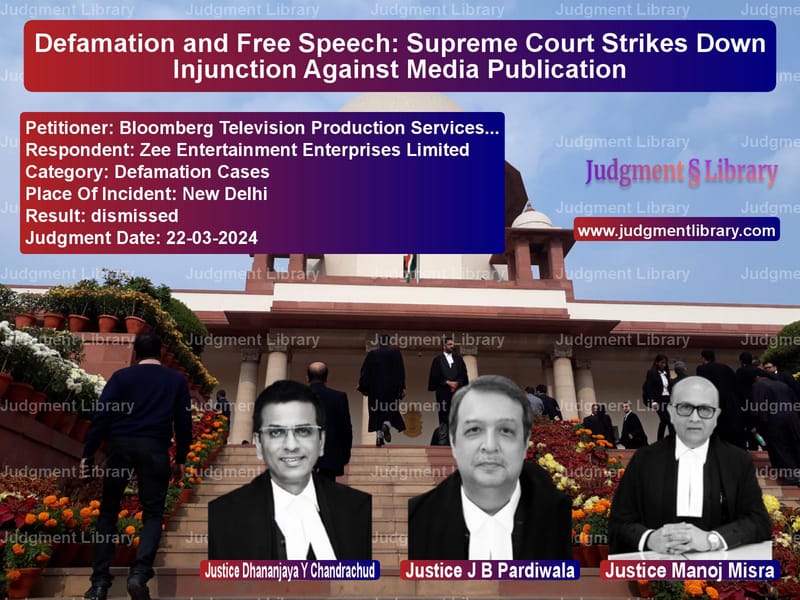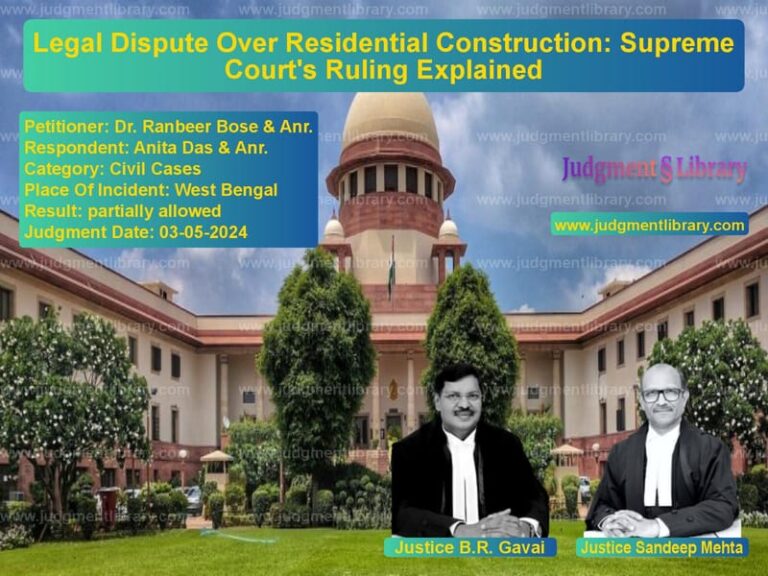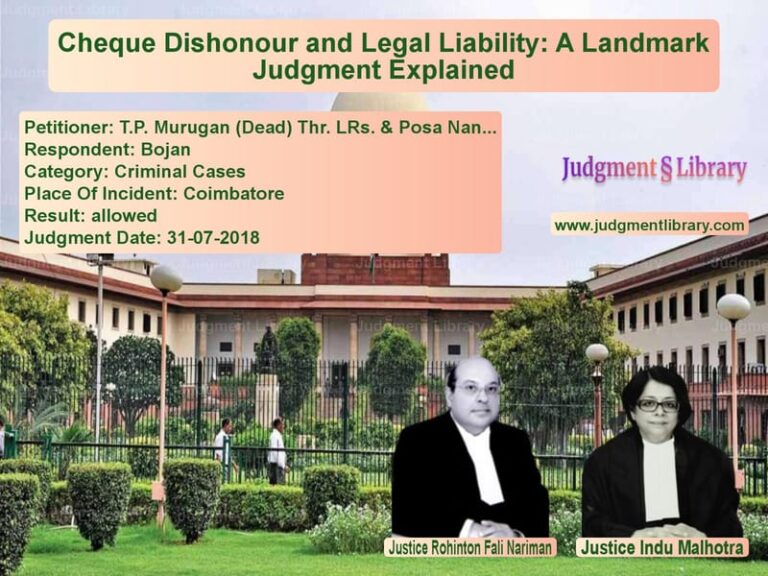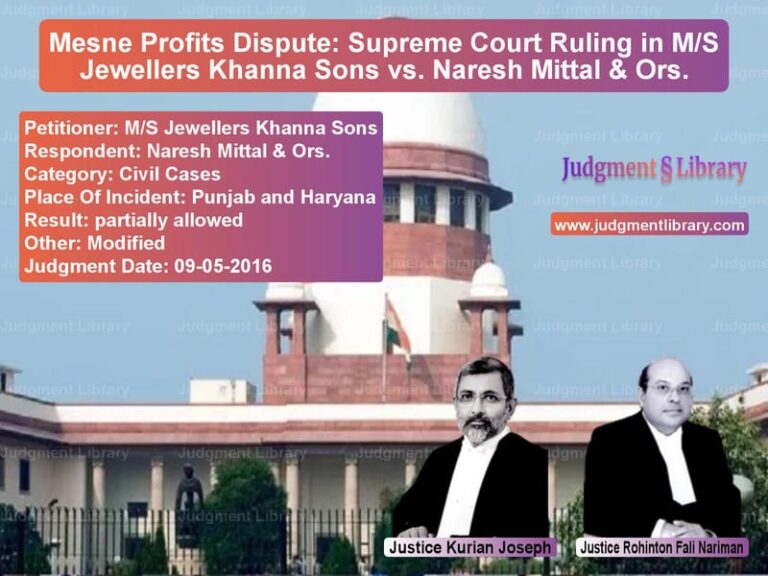Defamation and Free Speech: Supreme Court Strikes Down Injunction Against Media Publication
The Supreme Court of India recently delivered a landmark ruling in Bloomberg Television Production Services India Private Limited & Ors. vs. Zee Entertainment Enterprises Limited, which underscores the critical balance between defamation laws and the fundamental right to free speech. The case revolved around an ex-parte ad interim injunction that restrained Bloomberg from publishing an article about Zee Entertainment, raising key constitutional and legal questions regarding pre-trial censorship, defamation, and journalistic freedoms.
Background of the Case
The dispute began when Bloomberg published an article on February 21, 2024, concerning Zee Entertainment. Zee filed a defamation suit against Bloomberg before the South Saket Courts, New Delhi, seeking to restrain the publication and circulation of the article. On March 1, 2024, the trial court granted an ex-parte ad interim injunction directing Bloomberg to remove the article from its online platform and restraining it from publishing any related content. This injunction was later upheld by a Single Judge of the Delhi High Court on March 14, 2024.
Bloomberg challenged these orders before the Supreme Court, arguing that the trial court and the High Court had failed to apply the established legal principles for granting interim injunctions in defamation suits. The case raised crucial issues regarding the rights of journalists and media houses, the doctrine of prior restraint, and the application of the three-fold test for granting interim relief.
Arguments by the Petitioner (Bloomberg)
The legal counsel for Bloomberg made the following submissions before the Supreme Court:
- The trial court and the High Court failed to provide adequate reasoning for granting the injunction.
- The three-fold test of (i) prima facie case, (ii) balance of convenience, and (iii) irreparable loss or harm was not properly applied.
- The injunction was granted without giving Bloomberg a chance to present its defense, violating principles of natural justice.
- The trial court’s decision amounted to unconstitutional prior restraint on journalistic freedom.
- The Bonnard principle should apply in defamation cases, which states that courts should not grant interim injunctions unless it is clear that the defendant has no valid defense.
Arguments by the Respondent (Zee Entertainment)
Zee Entertainment’s counsel defended the injunction, contending:
- The published article was defamatory and caused irreparable harm to Zee’s reputation.
- The trial court’s decision was based on precedents where courts have granted ex-parte injunctions in similar cases.
- If Bloomberg’s defense was valid, it could be established during trial, and till then, an injunction was necessary.
- Freedom of speech is not absolute and must be balanced against the right to reputation.
Supreme Court’s Observations
Chief Justice Dr. Dhananjaya Y Chandrachud, writing for the Bench, set aside the injunctions granted by the trial court and the High Court. The judgment laid down several key principles:
1. Importance of Applying the Three-Fold Test
The Court reiterated that interim relief in defamation cases must be granted only after satisfying the three-fold test:
- Prima facie case
- Balance of convenience
- Irreparable loss or harm
It criticized the trial court for mechanically applying this test without analyzing how the facts justified the injunction.
2. Need for Reasoned Orders
The Court observed:
“The trial Judge needed to have analyzed why such an ex parte injunction was essential, after setting out the factual basis and the contentions of the respondent made before the trial Judge.”
It held that the order lacked proper reasoning and amounted to “unreasoned censorship.”
3. Prior Restraint and Freedom of Speech
The Supreme Court emphasized that pre-trial injunctions against media publications must be granted with caution, as they have severe consequences on journalistic freedom. It cited the landmark Bonnard v. Perryman (1891) case, which held:
“The right of free speech is one which it is for the public interest that individuals should possess, and, indeed, that they should exercise without impediment.”
The Court held that an injunction should only be granted if the publication is shown to be “palpably false” or “malicious.”
4. SLAPP Suits and the Danger of Litigation Suppressing Public Debate
The Court also highlighted the growing concern of Strategic Litigation Against Public Participation (SLAPP) suits, where powerful entities file defamation cases to silence criticism. It warned that courts must be cautious in granting interim injunctions in such cases.
5. Role of Appellate Courts in Reviewing Interim Relief
The Court held that appellate courts must interfere with interim orders if they are “arbitrarily, capriciously, or perversely” granted. It cited precedents stating:
“An injunction granted in defamation proceedings against a media platform, the impact of the injunction on the constitutionally protected right of free speech further warranted intervention.”
Final Decision
The Supreme Court set aside both the trial court’s order dated March 1, 2024, and the Delhi High Court’s order dated March 14, 2024. It directed the trial court to hear the matter afresh and decide on any injunction applications only after a detailed hearing.
The Court clarified:
“The purpose of this judgment is to provide the broad parameters to be kept in mind while hearing the application for an interim injunction.”
Implications of the Judgment
This ruling has far-reaching implications for media freedom, defamation law, and judicial standards in granting interim relief. Key takeaways include:
- Pre-trial injunctions against media must be granted with caution.
- Courts must provide detailed reasoning when granting interim relief.
- The rights of free speech and reputation must be balanced carefully.
- SLAPP suits must be scrutinized to prevent misuse of defamation laws.
This judgment reaffirms the judiciary’s commitment to upholding press freedom and protecting democratic discourse from undue restrictions.
Petitioner Name: Bloomberg Television Production Services India Private Limited & Ors..Respondent Name: Zee Entertainment Enterprises Limited.Judgment By: Justice Dhananjaya Y Chandrachud, Justice J B Pardiwala, Justice Manoj Misra.Place Of Incident: New Delhi.Judgment Date: 22-03-2024.
Don’t miss out on the full details! Download the complete judgment in PDF format below and gain valuable insights instantly!
Download Judgment: bloomberg-television-vs-zee-entertainment-en-supreme-court-of-india-judgment-dated-22-03-2024.pdf
Directly Download Judgment: Directly download this Judgment
See all petitions in Civil Defamation
See all petitions in Criminal Defamation
See all petitions in Judgment by Dhananjaya Y Chandrachud
See all petitions in Judgment by J.B. Pardiwala
See all petitions in Judgment by Manoj Misra
See all petitions in dismissed
See all petitions in supreme court of India judgments March 2024
See all petitions in 2024 judgments
See all posts in Defamation Cases Category
See all allowed petitions in Defamation Cases Category
See all Dismissed petitions in Defamation Cases Category
See all partially allowed petitions in Defamation Cases Category







